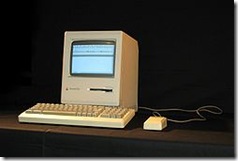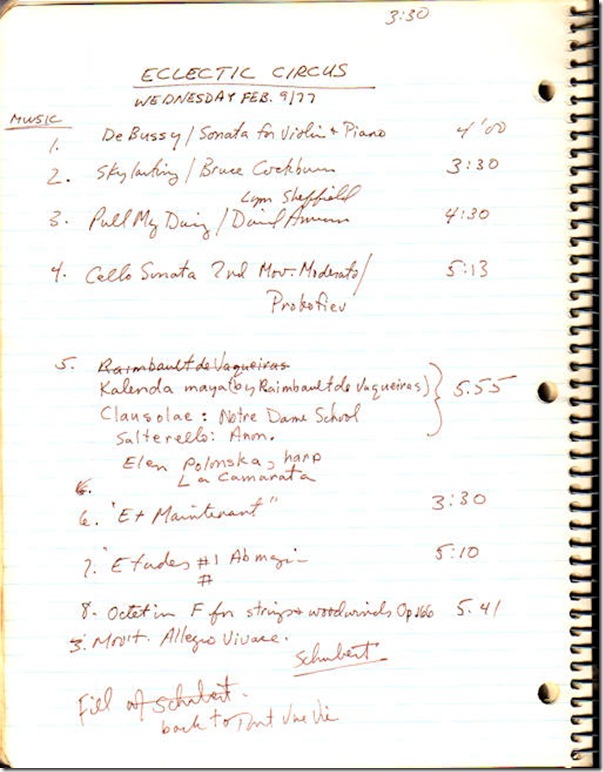My first computer was the Mac Plus:
A little magic box.
It was, however, no replacement for the thing that resembled a bird bath in Jason and the Argonauts that Zeus and Hera used to spy on the humans with. What was that thing called? I’ll post a reward.
Earlier than me, by about five years, some of my writers, notably The Frantics, invested in Macs which, like early cell phones, were the size and weight of a car battery. They’d haul them down the street like briefcases.
Another writer kept on using an IBM Selectric even after buying 3 different Macs. At the urging of his fellows, he decided to “get with it” and bought his first Mac and it sat, unpacked, in his basement till it become obsolete. More urging, more Macs – all unpacked. He died young, still using an electric typewriter. Aside from his colossal talent, I will remember that his scripts always arrived in perfect shape. He would rewrite a whole page if there was a typo, (spell-checked from memory) then go to a professional photocopier for the requisite number of scripts. He also did not drive, so all this was done by streetcar, or cab if recording-time was imminent.
Some guys at work were into arcane machines like the Osborne, and the early Commodores and PCs. They would come into the local pub, bringing foolscap pages full of code that just didn’t look like any fun. If I wanted a cryptic crossword, I would buy a paper.
The Mac was a lot friendlier but, even so, I couldn’t find anything on it. Documents would disappear straight into computer limbo. I didn’t even know what a folder or directory was. I missed all my bits of paper. I started to sympathize with my grandfather who was slandered for having the messiest workbench in all the basements in town. “I can put my hand on anything”, he would say.
Even with the help of friends who were really fluent in computer ways, I either couldn’t retain their little training sessions or else I was simply inadequate. Not really inadequate; I was a published writer and writing was all I wanted a computer for. Back then.
Up till that time, the only organization of information I needed to worry about was making a list of music for radio shows I was doing. I’d browse the record library, grabbing a few discs that grabbed my ear. I’d begin to add more discs and audition them in a listening booth.
Inevitably, I would end up with more music than would fit into my allotted time-slot. So began the juggling of musical pieces and calculations to make it all fit the one-hour format. All I can say is: thank God I didn’t have to play Wagner!
In the listening booth, I would end up with a list that looked remarkably like this:
I would then type this up on my Olympia typewriter, using 5-part green carbonless paper. Bang bang bang. I only needed 3 copies, one each for the announcer, the technician, and me.
Sometimes, a yearning kicks in for the analogue days. I miss handling tape, cutting it with a real razor blade, rocking the reels back and forth on the editing machine, sticking a final label on the tape, and a cue sheet inside the box, and carrying the whole thing down to master control. There was a physical rhythm that isn’t there today.
But even with all the wrangling between artistic programming and the clock, I was lucky. Structure was imposed on me by the network schedule. As I’ve mentioned in the Tangents post, my incoming info ends up all over the place. Where I record it, and how I organize it, is a real hit and miss exercise. Somehow, things would always work out as long as I knew the 4 walls I was working within. Then I could go crazy, with confidence.
This post is called “an overture” not only because of the musical connotations, but because, in the overall picture, writers can face great challenges getting their thoughts into a structure. And no matter what form the original ideas manifest themselves – in notebooks, Post-It Notes, the backs of receipts, you name it – chances are that a computer is going to get involved. Even if you get someone else to do the word processing and send it off by e-mail to a publisher. I wanted to tell my own lead-up to how I got interested in organizing snippets of writing by way of an introduction to the topic of “soft tools”, especially “outliners” and the philosophies around outlining.
Don’t worry, there will be pictures.
Today’s listening:
1. Heat Wave by Ben Sidran fr: “On The Cool Side”
2. The Underwood Typewriter by Fionn Regan fr: “The End of History”
3. Pull My Daisy by David Amram fr: “No More Walls”


